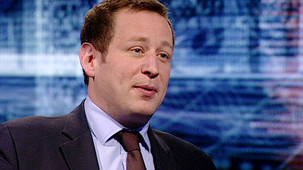Vaizey Promises One Filter Per Household To Fix 4G TV Interference

Ed Vaizey has outlined his plan to prevent the arrival of 4G clashing with TV signals, in an open letter to Ofcom
Communications Minister Ed Vaizey has explained the response of the government to the arrival of 4G mobile technology in the UK, which looks set to disrupt TV signals for millions of British households.
In February, the government announced that mobile operators would be required to pay into a £180 million fund that would be used to resolve any TV interference from 4G signals. Ofcom had predicted last year that 4G could impact as much as three percent of Digital Terrestrial Television (DTT) viewers, and suggested that filters would have to be applied to prevent disruption.
And in May this year, Ofcom warned that 2.3 million people could have their television signal disrupted once the long-awaited UK 4G networks have launched in the fourth quarter of this year and early 2013.
4G TV interference plans
This is because among the frequencies that Ofcom is set to auction for 4G use, is the 800MHz spectrum, which is close to the 700MHz spectrum currently used for DTT. Those likely to be affected by the arrival of 4G are households that use signal amplifiers, and those homes which rely on a communal aerial.

Vaizey has outlined the government’s plan to tackle this issue in his open letter to Ofcom, which says that out of the 2.3 British homes likely to be affected by this issue, only 900,000 are likely to rely on DTT for their primary viewing. This means, said Vaizey, that less than one million people will be directly affected, as the rest will be using alternative TV options such as satellite (Sky TV), cable (Virgin Media) or even broadband (BBC iPlayer etc).
Like the government’s help for those who could not afford the equipment during the recent switchover to digital TV services, the government will only fund the installation of one fix (i.e. a filter) per household. This means that for households with more than one television set, they will have to pay for the cost of additional filters.
Vaizey points that the installation of a free filter to their TV reciever should sort any interference issues. However some households have outside amplifiers installed, and these households will be provided with “vouchers” to cover the cost, estimated at approximately £50 + VAT, to get a professional installer to come and fit the filter.
Filters Not Enough
But Vaizey’s plans also highlight the fact that some households in the UK will not benefit from the filter, and will have to drop DTT altogether and turn to alternative sources such as cable, satellite and broadband.
“Ofcom has estimated that 38,500 premises are in this category, although the number falls to 17,000 if some limited level of network mitigation were applied to the 150 worst interfering mobile base stations,” wrote Vaizey. “For these homes, assistance should be provided to switch to free-to-view satellite or to cable TV. In some cases including the 500 or so homes which it may not be possible to serve by satellite or cable -it may be appropriate to look at alternative ways of restoring good DTT reception, up to a limit of £10,000 per household.”
Vaizey also outlined his efforts to ensure mobile network operators (MNOs) honour their commitment to this 4G TV clash.
The MNOs will create a body called Mitco to assess the challenge. Mitco in turn will be monitored by a governing body set up by the government to ensure it meets targets to minimise disruption to consumers.
“I am very keen to see Mitco fully operational as soon as possible,” wrote Ed Vaizey. “Clearly there is a considerable amount of work to be done by the MNOs and others to put in place an effective scheme of assistance.”
“To help the MNOs prepare, I intend to appoint one or more people shortly to develop the potential constitutional and governance arrangements for Mitco, and to establish much of the operational framework that Mitco will need,.” he wrote.
Vaizey said that out of the £180m fund, £100m would be needed for the provision of filters. £8m would be required for platform changes, and £20m would be set aside for vulnerable or elderly people. £12 million would be used for the professional installation of the filters, and £16m has been set aside for the scheme overheads.
“I am therefore confident that £180 million will be sufficient for the foreseeable tasks and includes a significant contingency which if not used will be returned to the MNOs when the scheme closes,” wrote Vaizey.
4G Arrival
The arrival of 4G technologies such as LTE is being long awaited by British businesses and consumers alike.
In May an Everything Everywhere survey revealed that 93 percent of business leaders in the UK want to see a 4G Long Term Evolution (LTE) network launched in the UK. Previous research has indicated that British businesses stand to lose hundreds of millions of pounds a year due to the delay in auctioning off spectrum allocated for 4G networks.
In February, the first commercial 4G network in the UK went live in London, after UK Broadband switched on an LTE network in the London Borough of Southwark, incorporating South Bank.
Of course, users of this network will need LTE compatible handsets to take advantage of this 4G network.
How much do you know about smartphones? Take our quiz.